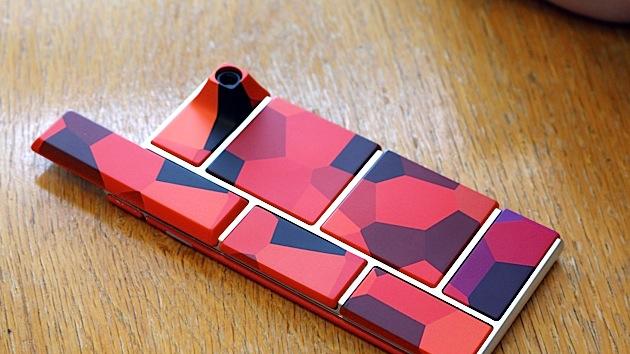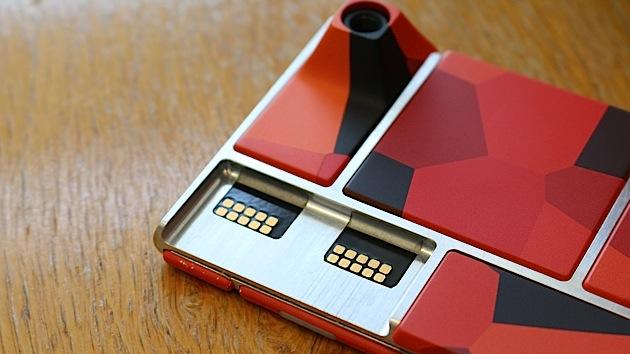ProjectARA
Latest

New Project Ara rival promises a modular phone with a focus on security
Project Ara isn't the only modular phone to look forward to anymore: it now has a fledgling rival in Vsenn, a startup co-founded by a former Nokia Android X program manager... at least according to its website. The project's so new, all its details can fit in a splash page at this point, though it has revealed enough to give us a decent idea of what it's about. Unlike Google's Project Ara, which has many swappable components, Vsenn will only have three -- the camera, the battery and the processor/RAM -- along with a replaceable back cover similar to those old Nokia brick phones. The phone will apparently come with three layers of encryption, though, as well as free access to a VPN network and a secure cloud service. Finally, the device will run vanilla Android with four years of guaranteed updates. We'll make sure to let you know when we hear more about the project. Or you can follow Vsenn's Twitter account, where the startup has divulged that its first model will have a 4.7-inch full HD screen, for more updates.

Five questions for the creator of Google's modular smartphone
It's been just over a year since Google's Advanced Technology and Projects (ATAP) division announced Project Ara, a full-scale effort to produce the world's very first modular smartphone. The team has been working hard and fast to get a unit on the market before the end of its two-year mission, and it's progressing quite nicely: We recently saw a functional "Spiral 1" prototype running on Android, and the next version -- "Spiral 2" -- should be getting into developers' hands later this year. Paul Eremenko, who heads up the Ara team, will be onstage at Engadget Expand with me for a live demonstration and fireside chat. We'll catch up on how things are progressing, how Ara has evolved since its inception, the most interesting use cases for a modular smartphone he's seen so far and also discuss the next Developer Conference, scheduled for January 14th, 2015, in Mountain View, California. In anticipation of his appearance at Expand, I reached out to Eremenko for a quick Q&A about Ara.

Project Ara team shows a working modular phone
You'd be forgiven for being skeptical of Google's Project Ara -- for all the prototypes and partnerships, actually spotting a working unit has been a gigantic challenge. You won't have to jump through hoops to see one after today, thankfully. The engineering team at NK Labs has shown Phonebloks a real, honest-to-goodness functioning test phone that boots into Android. It's using an old Jelly Bean release instead of the promised Android Lollipop build, and the demo doesn't include a significant amount of functionality, but hey -- progress!

Google plans to make a component store for its modular phone
Project Ara is surely one of the most exciting things Google is working on right now -- at least from the ones we're aware of. Better yet, given how young it is, chances are it will only keep getting better and more interesting. While speaking at a Purdue University event, Google's Paul Eremenko, director of Project Ara, recently revealed that the company will be taking a cue from the Play store to create a similar shopping experience for its modular smartphone. What this means, essentially, is you'd be able to buy or sell different components from a single hub, just as is the case now with apps, music, books and more on Google Play -- and it would also include reviews and recommendations. Eremenko didn't mention any details related to the status of Project Ara, but you can check out the full talk after the break.

Feedback Loop: Bad Apple, app automation and more!
In this week's edition of Feedback Loop, we discuss Apple's rough September, share our favorite tools for automating tasks and talk about Google's Project Ara. Head past the break to find out what Engadget readers like you have to say.

Engadget Daily: Windows 10, the $200 laptop you've been waiting for, and more!
It looks like Microsoft's new OS will be called Windows 10. Who'd have thunk it? Read on for Engadget's news highlights from the last 24 hours -- we go hands-on with Here maps for Android, break down Facebook's battle with drag queens and more.

You can hot-swap nearly all Project Ara modules on the fly
Back in April, Project Ara's Module Developers Kit revealed that the phone's battery will be hot-swappable; in other words, you can replace it without having to switch the phone off. Nifty trick, right? Well, the feature's apparently not limited to the device's battery. Project director Paul Eremenko has recently divulged in a keynote that you'll be able to swap the phone's other modules around, save for the CPU and display, even if you're in the middle of typing out a message or of a phone call. You've got the modified version of Android L that the team developed with non-profit org Linaro to thank for that, as it was the key ingredient Team Ara needed to make most of the phone's components hot-swappable.

Google's modular phone gets cheaper thanks to a new processor
One of the biggest challenges behind Google's modular Project Ara phone platform has been getting processors to play nicely with the technology. How do you let someone swap out the very heart of their device as easily as they would a memory card? By creating a CPU for that very purpose, that's how. Rockchip has started work on a system-on-chip with modular tech built-in; your phone won't need any bridge chips or other special tricks to let you switch processors on a whim. You won't see the hardware in action until a Rockchip-based Ara prototype arrives in early 2015. However, the plans show that Google's vision of a completely upgradable handset is both feasible and potentially inexpensive. Don't be surprised if some of the earliest Ara phones (or rather, their parts) easily fit within your budget.

Google prepares modular phone dev kits (but your idea had better be good)
If you're a developer eager to start tinkering with Google's Project Ara modular phone technology as quickly as possible, it's time to get in line. The company has started taking requests for test boards; if you fill out the form before July 18th and meet Google's expectations, you could have (very) early hardware in your hands before the end of the month. Latecomers can get in on a second wave if they sign up no later than August 18th. Just don't assume that you can pick up a kit purely out of curiosity. Google is prioritizing the board requests based on your know-how and the "strength" of your proposed module concept -- it wants signs that there's a real device in the works. You'll have to sit tight if you're simply a fan of the build-your-own-phone concept, then, but it's apparent that Project Ara is quickly becoming a tangible reality.

Here's how Google's modular phone will get its 3D-printed parts
Google's modular Project Ara smartphone is all about customization, but that creates a challenge: how are manufacturers supposed to build so many uncommon (and possibly unique) parts? The crew at 3D Systems is more than happy to tell you -- it just outlined the 3D printing techniques it's using to make Ara a reality. The company is dropping the conventional printing process, which bogs down due to frequent changes in speed, in favor of a continuously moving system that's fast enough to cope with mass production. The technique should generate "millions" of parts, even when some components need special treatment.

The Engadget Podcast is live at 12PM ET!
After last week's Very Special Episode, we've grabbed a Hair of the Dog (or two...or three), a bit of rest, and we're back for a regular ol' episode of The Engadget Podcast. We're discussing a triplet of topics that are assuredly close to your heart and head: the experimental and bizarre phones from Amazon and Google, and the hit security flaw that all the kids are raving about (Heartbleed). The show starts at 12PM ET sharp(ish), so grab your favorite plate of leftovers, a set of cans and a comfy seat. And tune in!

Toshiba's vision for Project Ara extends to wearables and beyond
Project Ara is primarily focused on building a modular smartphone in the hopes of changing the industry, but is that the only type of mobile device on the drawing board? Absolutely not. An executive at Toshiba, one of Google's partners on the project, just revealed that his company's vision of the concept goes beyond smartphones. Shardul Kazi, Senior VP and Technology Executive at Toshiba, posited that devices like smartwatches (and beyond, he says) could also take advantage of Ara's blocky component modules, which allow you to mix and match whatever features and components you want to have.

Google's Project Ara wants to revolutionize the smartphone industry within a year
The night before Google's Advanced Technology and Projects (ATAP) division was supposed to show off the one and only functional Project Ara prototype to a room full of eager developers, someone dropped the phone and broke the display. At any other product reveal, this worst-case scenario would be a nightmare come true. Not to Google: The company made lemonade out of a lemon by turning it into a selling point for the modular smartphone. A year from now, painful situations like this might be easily fixed by simply buying a new display and swapping out the broken one. Not that it would've made much of a difference if last night's fiasco never happened. Attendees at this week's Project Ara developer conference wouldn't have been able to boot up the prototype and play around with it like any typical smartphone -- in this case, "functional" is not the same as "functioning" -- but at least it would've made for a better presentation. Regardless of how it looked, however, we were able to briefly handle the Project Ara prototype and some of its first modules. To be clear, this is an extremely early model and there's a long way to go before it sees the light of day, but it at least allows us to get a good glimpse of what's to come over the next year as Ara continues to prepare for launch.

Google's Project Ara developer conference is live, watch it here
Google's modular smartphones have come a long way since that kooky Phonebloks concept video went viral last year, and now the company's digging deeper than it ever has before at its first Ara Developer Conference. Couldn't jump on a flight to Mountain View? Never fear -- Google is streaming it, and you can watch the whole thing right here. Here's the rub, though: as the name implies, the event is meant to get would-be module developers familiar with the process of designing and making physical bits that pop into a phone that seems yanked from the pages of a pulp sci-fi novel. That means it'll be a perhaps a little heavier on the technical detail than one might like, but we'll be keeping out eyes and ears open for all the spiffy details you should know about.

Google's modular phones: hot-swapping batteries is just the beginning
Google teased us with a behind-the-scenes look at Project Ara's progress last week, and now it's giving would-be module makers some meat to dig into with its new Module Developers Kit. As the name implies, this release really isn't meant for laymen: it's a set of guidelines for how those bits should look and interact with the endo (Google's pet name for the phone skeletons you pop those modules into), along with schematics and code samples to play with. That said, there still a few neat morsels worth noting! Google has some awfully flexible plans for how future Ara phones will handle battery modules, for instance: Users of an Ara phone will be able to power their device with one or multiple batteries; they will be able to swap a depleted battery with a fresh one, without powering off their phone; they will be able to charge one or more batteries in their phone from one or multiple charging devices.

Here's another peek at Google's build-your-own-smartphone project
Project Ara has only exploded in prominence since Google unloaded Motorola earlier this year, and now we're getting yet another peek at the work in progress. The Phonebloks team just released a video showing off the progress Google and its partners have made on those modular smartphones, and things are coming along just as quick as you'd expect.

Google wants its Project Ara modular smartphone to cost $50
How much will a modular smartphone set you back? If Google gets its way, about $50 -- assuming you forgo all of the bells and whistles. The team behind Project Ara wants to launch what it calls a "grayphone," a barebones customizable exoskeleton that comes with little more than a screen, a frame and a WiFi radio. That wouldn't be much of a phone, of course, but it's only the bait. Google's Paul Eremenko told Time Techland that users would customize their underpowered husks at special kiosks outfitted with tools to help customers build the device that's right for them. Sounds bold? It is, a little; the team admitted to Time that it hasn't actually reached its price target just yet, and between the FCC and public opinion, it still has more than a few hurdles to leap before its modular cellphone is ready for market. That said, Eremenko says the focus is to make Ara great, not profitable -- a statement that adds to the nebulous handset's allure. Skip down to the attached source for Time's full rundown of Project Ara, Google's ATAP group and Eremenko's thoughts on redesigning the smartphone.

Google's Project Ara modular smartphone gets a trio of dev conferences
Google's got plenty of moonshots brewing in its Advanced Technology and Projects (ATAP), but one of the most intriguing is its modular smartphone design, called Project Ara. Because Ara's a platform designed to lets users swap out hardware (processors, cameras, or sensors) on the phone, it presents unique opportunities for developers to build different kinds of modules and the software needed to make them all work. That's why ATAP's going to be doing three developers' conferences this year, with the first one set to happen April 15-16 at the Computer History Museum in Mountain View, California. Folks that want to attend, but are outside striking distance of the Bay Area need not fret, however, as there will be a live webcast and interactive Q&A sessions of the conference, too. This initial event will focus on building the modules themselves, as Google will be making an alpha version of its Module Developers' Kit available at the beginning of April. We don't know what the other two conferences will be about (though software development for Ara seems a good bet), but more info and the conference agenda can be found at projectara.com in the coming weeks.

Lenovo gets Motorola, but Google gets to keep its skunkworks
Lenovo may be buying a brand to help it sell smartphones across the world, but it's not getting everything that was under Motorola's umbrella. In addition to the "vast majority" of Motorola's patents, Google will also hold onto the Advanced Technology and Projects division and fold it into its Android team. That group is responsible for some of Motorola's more wild-eyed projects, like the authentication pills and tattoos that ATAP chief Regina Dugan showed off at AllThingsD's D11 conference. The most eye-catching example of the group's work was Project Ara, the modular smartphone initiative that first started turning heads in late October. Motorola CEO Dennis Woodside said the prototype phone was nearly done just over a month later, and the company planned to get the Ara module dev kit out the door this winter. It seemed like the team was making real progress, but we'll soon see if those plans have shifted now that Motorola is leaving the building.

Motorola inks deal with 3D Systems to build its modular 'Ara' smartphones
When Motorola threw its weight behind Phonebloks' modular smartphone concept, it pretty much signaled to the rest of the industry that the Google company was dead serious about customization. But that radical vision of a completely upgradeable handset needs an equally radical manufacturing partner and Motorola's found that in 3D Systems. Today, the two companies have announced a multi-year deal that'll see 3D Systems building what Motorola calls "the factory of the future," and providing a complete end-to-end fabrication process for 'Project Ara.' As part of the deal, Motorola's exclusively tasking 3D Systems with creating new "multi-material printing capabilities including conductive and functional materials" to build these modules (e.g., chassis, battery, etc.) and help it keep pace with eventual consumer demand for 'Ara' phones. That's all if 3D Systems can prove its undeveloped printing process actually, you know, works. If not, well, 3D Systems can kiss that exclusivity agreement goodbye.









